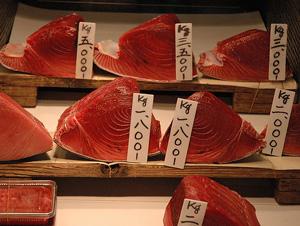Proposed ban on bluefin tuna trade
Tuna steaks on display at a Tokyo fish market. (Image: Flickr user jaybergesen (cc: by-nc-sa))
The bluefin tuna, a prized fish which is part of a larger Atlantic blue-fin population, has been over harvested for years. This week brought a ray of hope for the Atlantic blue-fin. Leaders of the European Union threw their weight behind a movement to ban all trade in the fish.
“The World’s” Gerry Hadden filed this report.
Recent scientific studies have convinced EU leaders to back a ban on the blue-fin trade. Other efforts to regulate the fishery have largely failed. EU researchers and others say it could collapse within three years if drastic action isn’t taken. Monaco first proposed the global ban on blue-fin trade earlier this year. This week the European Commission official got behind it.
The commission’s Barbara Helfferich made the announcement in Brussels: “The commission recommends provisional European Union support for Monaco’s proposal to list Atlantic fin tuna. The European commission shares many of the concerns about the state of stocks of Atlantic blue-fin tuna.”
The ban wouldn’t prohibit fishing for blue-fin directly. Instead it would outlaw buying or selling the fish. Supporters say that makes more sense because the end result is the same. If you can’t sell blue-fin you’ll stop catching them.
And says Aaron McGlocklin of World Wildlife Fund, policing the seas has simply proven too difficult and costly, “The EU is spending on or around for the last two years $10 million Euros with satellites in the sky on surveillance at every port. You know they’re spending tens of millions to try and enforce the rule of law in this fishery.”
McGlocklin says Europe should be applauded for rallying to the fish’s defense but he says unless the majority of the signatories to the Global Endangered Species Treaty follow suit, the blue-fin is doomed. That’s because it isn’t just the European’s fishing for it. Other Mediterranean countries such as Libya have big fleets too.
And McGlocklin says Europe has long complained that Libya doesn’t respect catch limits, “So how are you going to manage it? You know whatever the Europeans did it wouldn’t really matter because you’ve got half the fishery being controlled by you know Colonel Gadaffi’s son so you know the rational thing is to ban the trade.”
Similar bans have worked before helping to save swordfish and sturgeon stocks from collapse. According to the website of the Convention on International Trade and Endangered Species, a blue-fin ban would be at least a short-term blow to fishermen around the Mediterranean; but hardest hit would be far away Japan.
Japan imports 90% of the world’s blue-fin for use in sushi and other dishes. The Japanese company Mitsubishi controls the market. Mitsubishi officials would not agree to an interview but they did release a statement saying the company supports reduced-catch limits or even a moratorium if the current research calls for such measures.
Mitsubishi has been preparing for such a scenario for a while. It’s already deep frozen thousands of tons of blue-fin should the market for fresh tuna suddenly disappear.
The 175 members of the convention on endangered species will vote on the blue-fin ban in March. It needs a simple majority to pass.
PRI’s “The World” is a one-hour, weekday radio news magazine offering a mix of news, features, interviews, and music from around the globe. “The World” is a co-production of the BBC World Service, PRI and WGBH Boston.
Every day, reporters and producers at The World are hard at work bringing you human-centered news from across the globe. But we can’t do it without you. We need your support to ensure we can continue this work for another year.
Make a gift today, and you’ll help us unlock a matching gift of $67,000!
